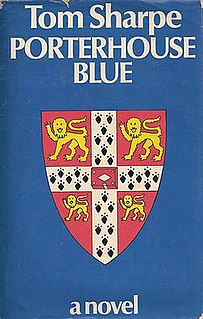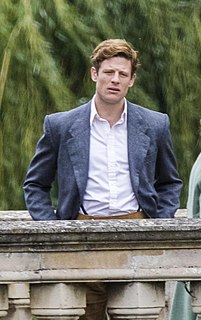
Colonel Sebastian "Basher" Moran is a fictional character in the stories written by Arthur Conan Doyle. An enemy of Sherlock Holmes, he first appears in the 1903 short story "The Adventure of the Empty House". Holmes once described him as "the second most dangerous man in London," the most dangerous being Professor Moriarty, Moran's employer.

Porterhouse Blue is a novel written by Tom Sharpe, first published in 1974. A satirical look at Cambridge life and the struggle between tradition and reform, Porterhouse Blue tells the story of Skullion, the Head Porter of Porterhouse, a fictional college of Cambridge University.
The Massachusetts Institute of Technology (MIT), a private research university in Cambridge, Massachusetts in the United States, has been mentioned in many works of cinema, television, music, and the written word. MIT's widespread overall reputation has greater influence on its role in popular culture than does any particular aspect of its history or its student lifestyle. Because MIT is well known as a seedbed for technology and technologists, the makers of modern media are able to use it to effectively establish character, in a way that mainstream and international audiences can immediately understand. A smaller number of creative works use MIT directly as their scene of action.
This articles lists various works of fiction that take place in Boston, Massachusetts:

I'll Fly Away is an American television drama series that aired on NBC from October 7, 1991, to February 5, 1993. Set during the late 1950s and early 1960s, in an unspecified Southern U.S. state, it starred Regina Taylor as Lilly Harper, a Black housekeeper for the family of district attorney Forrest Bedford, played by Sam Waterston. As the show progresses, Lilly becomes increasingly involved in the Civil Rights Movement, which eventually pulls in her employer, as well.

Sherlock Holmes has long been a popular character for pastiche, Holmes-related work by authors and creators other than Arthur Conan Doyle. Their works can be grouped into four broad categories:
Yale University, one of the oldest universities in the United States, has been the subject of numerous aspects of popular culture.
Lord Jeremy Pimpole is a fictional character created by author Tom Sharpe, a British novelist. The character of Lord Pimpole is first mentioned in Porterhouse Blue (1974), set in the fictitious Porterhouse College in Cambridge, where his name, with that of a former student, Launcelot Gutterby, is often chanted to himself by Skullion, the Head Porter, as the mantra "Gutterby and Pimpole", when it seems that standards at the College are slipping. This helps to remind Skullion of the days when students had been proper gentlemen.
The University of Oxford is the setting for numerous works of fiction. Quickly becoming part of the cultural imagination, Oxford was mentioned in fiction as early as 1400 when Chaucer in his Canterbury Tales referred to a "Clerk [student] of Oxenford":
"For him was levere have at his beddes heed/ Twenty bookes, clad in blak or reed,/ of Aristotle and his philosophie/ Than robes riche, or fithele, or gay sautrie".
James Robert Runcie is a British novelist, documentary filmmaker, television producer and playwright. He is Commissioning Editor for Arts on BBC Radio 4, a Fellow of the Royal Society of Literature and a visiting professor at Bath Spa University.
Tulane University has been portrayed in several books, television shows, films and video games. Also, the campus and affiliated buildings have been used for several productions.
This article describes minor characters from the Sherlock Holmes stories by Sir Arthur Conan Doyle, and from non-canonical derived works. The list excludes the titular character as well as Dr. Watson, Professor Moriarty, Inspector Lestrade, Mycroft Holmes, Mrs. Hudson, Irene Adler, Colonel Moran, the Baker Street Irregulars, and characters not significant enough to mention.
Princeton University, one of the oldest universities in the United States, has been the subject of numerous aspects of popular culture. The trend accelerated after Princeton was ranked #1 by U.S. News & World Report at the start of the 21st century.
Blue Stockings is the first full-length play by Jessica Swale. It is set at Girton College, Cambridge in 1896. Its title refers to bluestockings, a derogatory term for female intellectuals. The action involves four very talented female undergraduates and the campaign to be allowed like their male colleagues to receive a formal degree qualification at the end of their studies. The play touches on some of the issues surrounding the feminist ideals of the late nineteenth-century New Woman including female bicycle-riding, equal education rights, sexual autonomy, and political enfranchisement.

James Geoffrey Ian Norton is an English actor. He is known for roles in the television series Happy Valley, Grantchester, War & Peace and McMafia. He earned a nomination for the British Academy Television Award for Best Supporting Actor in 2015 for his performance as ex-convict Tommy Lee Royce in Happy Valley.

Grantchester is a British ITV detective drama, set in the 1950s Cambridgeshire village of the same name. The show first featured Anglican vicar Sidney Chambers, and subsequently vicar William Davenport, both of whom develop a sideline in sleuthing with the help of Detective Inspector Geordie Keating. The series is based on The Grantchester Mysteries, collections of short stories written by James Runcie. The first series was based on the six stories from the first book, Sidney Chambers and the Shadow of Death, and was broadcast in 2014. A second series aired in March and April 2016, and a third series began its run on 23 April 2017. A fourth series was announced on 12 April 2018, and it was confirmed that this would be the last to feature James Norton in the lead.
Brown University is a private research university in Providence, Rhode Island. Like other members of the Ivy League, it is known for prestige, academic rigor and selective undergraduate admissions process. Among its peers, Brown is noted for a culture of campus activism and longstanding commitment to academic and intellectual freedom exemplified by its Open Curriculum and course "shopping period." The university has been described as the "progressive Ivy," "hip Ivy," and "creative Ivy."

Normal People is an Irish romantic psychological drama television series produced by Element Pictures for BBC Three and Hulu in association with Screen Ireland. It is based on the 2018 novel of the same name by Sally Rooney. The series follows the relationship between Marianne Sheridan and Connell Waldron, as they navigate adulthood from their final days in secondary school to their undergraduate years in Trinity College. The series was primarily written by Rooney and Alice Birch and directed by Lenny Abrahamson and Hettie Macdonald.
















